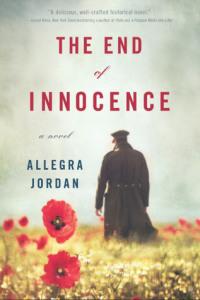 I really enjoyed this historical novel about World War I. It focuses on a very specific group: the lives of Harvard and Radcliffe students at the outbreak of World War I.
I really enjoyed this historical novel about World War I. It focuses on a very specific group: the lives of Harvard and Radcliffe students at the outbreak of World War I.
Helen Brooks is an upper-class student attending Radcliffe in the fall of 1914. She’s embarrassed by her mother, an activist most recently arrested for distributing contraceptives. She’s been dumped by the guy she thought she’d marry. On the up side, she loves reading and writing poetry and is thrilled to be accepted into a prestigious Harvard writing class (which is available since half the men in the class have enlisted).
She meets two cousins at Harvard. Riley is a dashing Brit who sweeps her off her feet at a ball. She’s warned repeatedly about his womanizing ways. Riley’s cousin, Wils, is a talented poet who comes from an aristocratic German family.
Put this way, the book sounds pretty trite… will the smart pretty girl choose the handsome womanizer or the sensitive poet? Thankfully, the book transcends these stereotypes pretty quickly. The relationship that Wils and Helen develop is based on affection and mutual respect and doesn’t happen overnight. And the real issue is not who’s in love but what’s happening around them because of the war.
As a German student, Wils is surprised to encounter distrust and even hatred from his fellow students. He expects better of his Harvard community but he sees German faculty experiencing the same thing. The U.S. has not joined the war yet but patriotism is pretty quickly turning to accusations and violence. Wils wants to continue his education, but he’s pressured by his family to return home and enlist, and the harassment on campus makes it nearly impossible to stay.
I enjoyed reading this book because I came to like the characters. Helen starts out pretty self-centered but grows throughout the book. The love story felt real, and I liked that some interesting side issues were addressed, like Wils’ feelings of guilt about his friend’s death, and his inability to accept that his friend might have killed himself. I also appreciated the complexity of where students (or people in general) draw the line between patriotism and extremism during wartime.
The book is basically told in three parts: the events leading up to enlistment, the War, and the aftermath.
Some of this book takes place on the World War I battlefield, and in my opinion this was the weaker part of the book. The battle scenes are necessary to give this book the proper context, but it wasn’t enough to give me more of an understanding of the war than I already had, and I’m not sure all of it made sense (specifically, Wils and Riley arranging to meet even though they’re on opposite sides). Still, I’m no expert.
The third part was satisfying although the resolutions felt a little forced at times. For example, Helen has to come to terms with her feelings about her mother’s activism. To tell you more here would give away some key plot points, so I won’t do that.
I will say that the final part of the story focuses on the building of a memorial to Harvard students who died serving in the war. I always find true stories more interesting and that was the case here. Jordan does a nice job in an epilogue of explaining the true and fictional aspects of the story and how she was inspired to write it.
Since this year marks 100 years since the start of the War, I was happy to have the opportunity to read good historical fiction about it. I definitely recommend this book if you’re interested in reading more about this time period.
Note: I received a complimentary copy of this book from Sourcebooks Landmark in exchange for an honest review. The book will be released on August 26, 2014.

